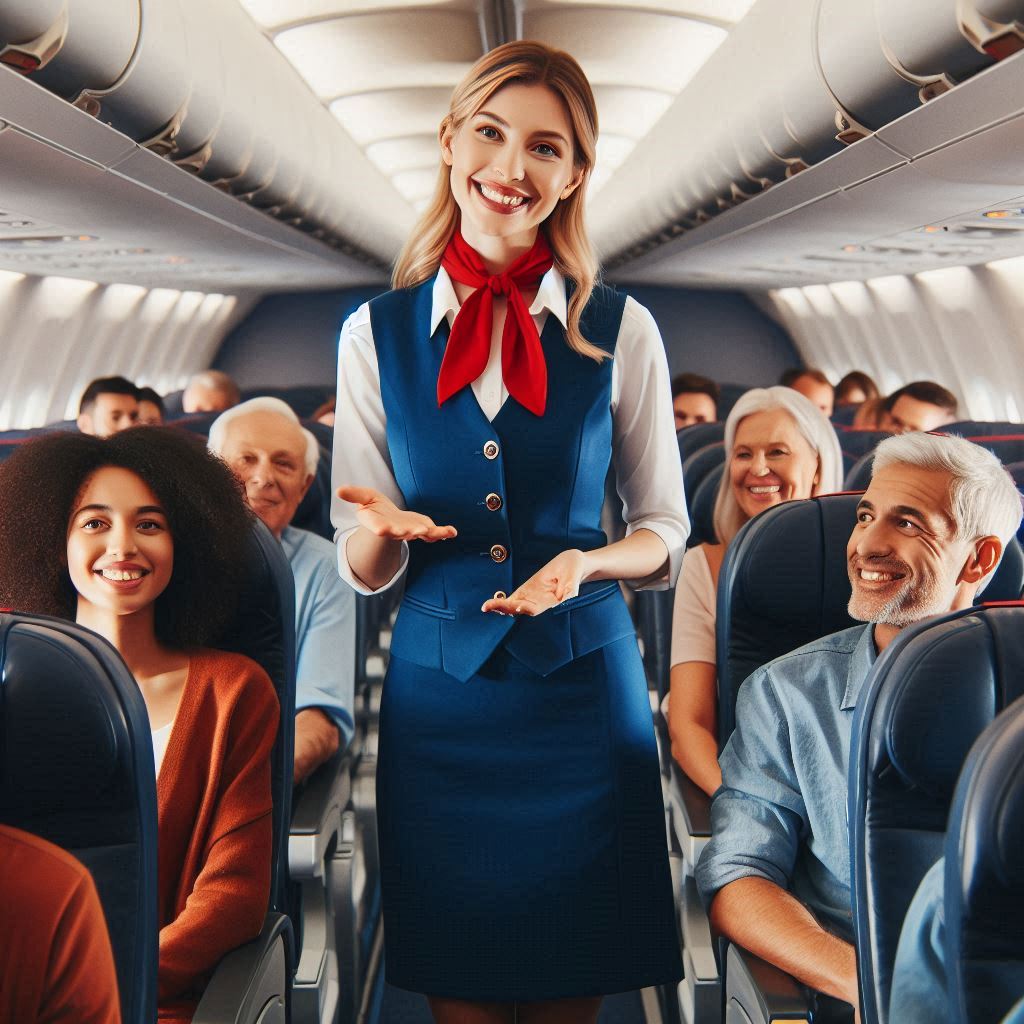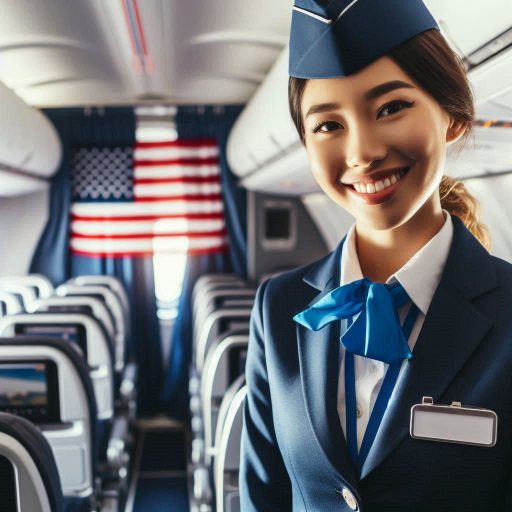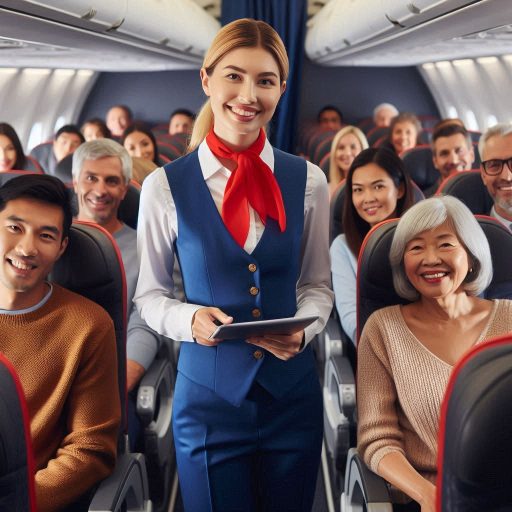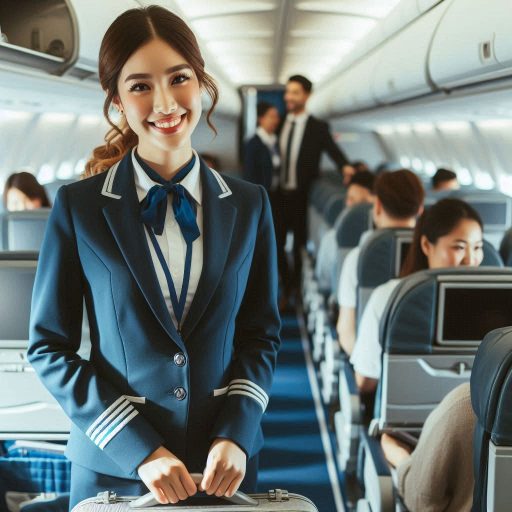Introduction
Flight attendants play a crucial role in the airline industry, serving as the frontline representatives of airlines.
Their primary responsibility is to ensure the safety and comfort of passengers throughout the flight.
Flight attendants conduct safety demonstrations, distribute emergency equipment, and provide assistance during emergencies.
Their training enables them to respond effectively to various in-flight situations, including medical emergencies and cabin disturbances.
Beyond their safety responsibilities, flight attendants also enhance the travel experience by offering excellent customer service.
They attend to passengers’ needs, serve food and beverages, and maintain cabin order, all while ensuring that the airline’s policies are upheld.
The ability of flight attendants to handle various situations with professionalism and poise is essential to the overall success of an airline.
They often work long hours, travel to various destinations, and adapt to changing schedules, showcasing their resilience and adaptability.
These qualities are not only vital for passenger satisfaction but also contribute to the airline’s reputation and operational success.
Job Responsibilities
The Various Tasks and Responsibilities of a Flight Attendant
Flight attendants play a crucial role in the aviation industry.
Their primary responsibility is to ensure passenger safety and comfort during flights.
Each flight attendant undergoes extensive training to handle various situations effectively.
Before takeoff, flight attendants conduct safety checks.
They inspect emergency equipment and ensure that cabin areas are secure.
These checks help prevent potential hazards during the flight.
During boarding, flight attendants greet passengers and assist them with their seats.
They provide information on the flight’s duration and weather conditions.
They also help passengers store carry-on luggage safely in overhead compartments.
Once everyone is seated, flight attendants demonstrate safety procedures.
They show passengers how to fasten seatbelts, use oxygen masks, and locate emergency exits.
These demonstrations enhance passenger awareness of safety protocols.
Throughout the flight, flight attendants monitor the cabin.
They ensure that passengers adhere to safety regulations.
They address any concerns or questions that arise during the journey.
Providing excellent customer service is another key responsibility.
Flight attendants serve meals, snacks, and beverages.
They accommodate special requests and cater to dietary restrictions whenever possible.
Their attentiveness enhances the overall travel experience.
Transform Your Career Today
Unlock a personalized career strategy that drives real results. Get tailored advice and a roadmap designed just for you.
Start NowHow These Duties Contribute to Passenger Safety and Comfort
Flight attendants have diverse responsibilities that extend beyond serving food.
Their tasks directly impact passenger safety and comfort.
They are essential to ensuring a positive flying experience, from safety checks to conflict resolution.
The commitment and professionalism of flight attendants greatly enhance air travel.
Read: How to Deal with Pet Grooming Allergies
Factors Affecting Salary
The Different Factors That Can Impact a Flight Attendant’s Salary
Understanding the various factors that can impact a flight attendant’s salary is essential for those considering this career path.
Multiple elements come into play when determining earnings in this field.
Experience
Experience plays a significant role in determining salary.
Entry-level flight attendants often earn lower salaries than their experienced counterparts.
Airlines reward experience with higher pay rates.
Senior flight attendants typically earn more due to their extensive industry knowledge.
They also gain additional benefits over time, such as better schedules and travel perks.
Airline Size
Airline size and reputation also impact salary levels.
Major airlines generally offer higher salaries compared to regional carriers.
Larger airlines benefit from greater resources, allowing them to pay their employees better.
These airlines often have structured pay scales that reflect an employee’s seniority.
In contrast, smaller airlines may provide lower starting salaries.
However, they might offer other benefits, such as a more relaxed work environment or more flexible schedules.
Geographic Location
Geographic location affects salaries as well.
Flight attendants working in large metropolitan areas often earn higher wages.
The cost of living in these areas can drive up salary expectations.
For instance, flight attendants based in cities like New York or San Francisco usually earn more than those in smaller towns.
Airlines must compensate for the higher living expenses in these regions.
Flight Schedules
First, Flight schedules can also influence earnings
Flight attendants who work more hours can earn more money
Many airlines offer overtime pay for hours worked beyond a certain threshold.
Additionally, international flight attendants often receive higher pay due to the nature of long-haul flights.
They also enjoy per diem allowances, which can significantly boost overall earnings.
Union Contracts
Union contracts can dictate pay scales as well.
Many flight attendants belong to unions that negotiate salaries and benefits.
Unionized flight attendants often enjoy higher wages and better job security.
These contracts typically set minimum pay rates that airlines must follow.
The strength of the union can significantly affect salaries and working conditions.
Seasonality
Seasonality can impact earnings, too.
Flight attendants may earn more during peak travel seasons, such as summer and holidays.
Airlines often increase flight schedules during these times, leading to more available hours.
This increase can result in higher salaries for flight attendants who are willing to work additional shifts.
Include factors such as experience, airline size, and geographic location
In summary, various factors influence a flight attendant’s salary.
Discussing these different factors helps aspiring flight attendants set realistic salary expectations.
Experience, airline size, geographic location, flight schedules, union contracts, and seasonality all play crucial roles in determining pay.
Understanding these elements can lead to more informed career decisions in the aviation industry.
Read: Creating a Comfortable Atmosphere in Your Nail Salon
Average Salary Range
General Overview of the Average Salary Range for Flight Attendants
Flight attendants play a vital role in ensuring passenger safety and comfort.
Their salaries can vary widely based on several factors.
On average, flight attendants in the United States earn between $30,000 and $70,000 annually.
This range reflects different experience levels and airline types.
Entry-level flight attendants typically earn salaries on the lower end of the spectrum.
New hires may start at around $30,000 to $40,000 per year.
As flight attendants gain experience, their salaries increase.
Those with several years of experience can expect to earn between $50,000 and $70,000.
Differences in Salary Based on Factors Like Experience and Airline
The airline you work for significantly impacts your salary.
Major airlines tend to offer higher salaries and better benefits compared to regional carriers.
For instance, flight attendants at Delta or American Airlines generally earn more than those at smaller airlines.
This difference often reflects the larger airlines’ financial resources and operational scale.
Experience also plays a crucial role in determining salary.
Flight attendants who have served for many years can secure higher-paying positions.
Seniority often leads to promotions and opportunities for more lucrative routes.
Showcase Your Business Today
Reach thousands of readers actively exploring professional services. Publish your business profile and grow your audience now.
Publish NowThese higher-tier positions can offer additional pay perks, including international trip allowances.
In addition to base salaries, flight attendants may receive various bonuses.
Many airlines provide incentives for working holidays, overtime, or additional shifts.
Some companies also offer signing bonuses to attract new talent, especially during peak hiring seasons.
Location can further influence salary levels.
Flight attendants working in high-cost living areas, like New York City or San Francisco, may earn more.
This adjustment helps to offset living expenses.
Read: How to Create a Pet-Friendly Grooming Environment
Starting Salary
What a New Flight Attendant Can Expect in Terms of Starting Salary
New flight attendants can expect to earn a starting salary that typically falls between $30,000 and $40,000 annually.
This initial salary often depends on the airline and geographic location.
Larger airlines generally offer more competitive starting salaries compared to smaller regional carriers.
In addition to the base salary, flight attendants may receive additional compensation for flight hours.
Pay often includes hourly wages for time spent in the air, which can boost overall earnings.
Some airlines also provide per diem allowances for meals and expenses during layovers.
Training or Probation Periods That May Affect Initial Pay
Most airlines require new flight attendants to complete a training program before they can officially begin their roles.
This training period usually lasts several weeks.
During training, new hires typically receive a stipend or hourly wage, but it may be lower than their eventual salary.
After completing training, flight attendants often enter a probation period.
This probation period can last anywhere from three to six months, depending on the airline.
During this time, new flight attendants may not receive full benefits or may have limited pay increases.
Once probation is completed, many flight attendants see their salaries increase.
They also become eligible for full benefits, which can significantly enhance their overall compensation package.
Understanding these factors can help new flight attendants set realistic salary expectations.
While the starting salary may not seem high, the potential for growth exists.
Many flight attendants report substantial salary increases after gaining experience and completing probation.
New flight attendants can expect starting salaries between $30,000 and $40,000.
Training and probation periods may initially affect pay but pave the way for future salary growth.
Aspiring flight attendants should keep these factors in mind when considering their career path.
Read: Nail Technician Networking: Building Industry Connections

Advancement Opportunities
How Flight Attendants Can Advance in Their Careers and Increase Their Salary
Flight attendants have several pathways to advance in their careers and increase their salary.
Gaining experience is one of the most significant factors that contribute to career advancement.
As flight attendants accumulate years of service, they often qualify for higher-paying positions.
Continuous education and training also play a crucial role in career progression.
Many airlines offer additional training programs that flight attendants can complete to enhance their skills.
Pursuing certifications in specialized areas, such as safety procedures or customer service, can make flight attendants more competitive for promotions.
Building a strong work ethic and a positive reputation can lead to increased opportunities.
Flight attendants who consistently perform well, demonstrate leadership skills, and maintain strong relationships with colleagues are often favored for advancement.
Networking within the airline industry can also open doors to new opportunities.
Opportunities for Promotion to Senior or Lead Flight Attendant Roles
One of the primary advancement opportunities for flight attendants is the promotion to senior or lead flight attendant roles.
Senior flight attendants often have more responsibilities, including supervising junior staff and managing cabin operations.
They play a crucial role in ensuring safety and efficiency on flights.
To become a senior flight attendant, individuals typically need to meet specific experience requirements, usually ranging from three to five years.
Airlines may also look for leadership skills and the ability to handle challenging situations effectively.
Lead flight attendants, sometimes referred to as purser or chief flight attendants, oversee the entire cabin crew on a flight.
They are responsible for ensuring compliance with safety regulations and addressing passenger concerns.
This position usually requires extensive experience and demonstrated leadership capabilities.
In addition to promotions, flight attendants may have opportunities to work in other areas within the airline.
Some may transition to roles in training, safety, or even management.
These positions often come with higher salaries and increased responsibilities.
Flight attendants can advance their careers and increase their salary through experience, training, and networking.
Promotions to senior or lead flight attendant roles offer additional responsibilities and higher pay.
By actively pursuing advancement opportunities, flight attendants can build a fulfilling and financially rewarding career in the aviation industry.
Benefits and Perks
The Various Benefits and Perks That Flight Attendants May Receive in Addition to Their Salary
Flight attendants enjoy a variety of benefits and perks that enhance their overall compensation package beyond their salaries.
These benefits can significantly contribute to job satisfaction and financial security.
One of the most valuable benefits is health insurance.
Most airlines offer comprehensive health plans, including medical, dental, and vision coverage.
These plans often extend to dependents, providing essential care for flight attendants and their families.
Retirement plans are another significant perk.
Many airlines provide 401(k) plans with employer matching contributions, allowing flight attendants to save for retirement effectively.
This benefit encourages long-term financial planning and stability.
Include Benefits Like Health Insurance, Travel Perks, and Retirement Plans
Travel perks are among the most exciting benefits for flight attendants.
They typically enjoy free or heavily discounted flights for themselves and often for family members.
This perk allows flight attendants to explore various destinations at a fraction of the cost.
Additionally, many airlines offer standby travel options, enabling flight attendants to book flights at discounted rates, even during peak travel seasons.
This flexibility can be a significant advantage for those who love to travel.
Flight attendants may also receive allowances for meals and accommodations during layovers.
These per diem payments help cover daily expenses while traveling for work.
Some airlines also provide hotel accommodations for long layovers, ensuring that flight attendants are comfortable during their time off.
Other benefits may include paid time off, flexible scheduling, and employee assistance programs.
Paid time off allows flight attendants to recharge and manage personal commitments, contributing to a healthy work-life balance.
Flexible scheduling can accommodate personal and family needs, making the job more appealing.
Flight attendants receive a variety of benefits and perks in addition to their salaries.
Health insurance, retirement plans, and generous travel perks significantly enhance their overall compensation.
These benefits contribute to job satisfaction and financial security, making a career as a flight attendant rewarding in multiple ways.
Negotiating Salary
Tips and Advice for Flight Attendants on Negotiating Their Salary
Negotiating salary can be a daunting task for flight attendants, but with the right approach, it can lead to favorable outcomes.
First, it’s essential to do thorough research before entering negotiations.
Understanding the average salary range for flight attendants in the industry and within your airline can provide a solid foundation for your discussions.
Second, prepare a list of your accomplishments and contributions to the airline.
Highlight any positive feedback from supervisors, customer satisfaction ratings, and successful team projects.
Having concrete examples of your value will strengthen your position during negotiations.
Additionally, be clear about your goals and what you want from the negotiation.
Whether seeking a salary increase or additional benefits, knowing your objectives will help guide the conversation.
Approach the negotiation with confidence, and maintain a professional demeanor throughout the process.
Strategies for Discussing Pay Increases and Promotions with Management
When discussing pay increases and promotions with management, timing is crucial.
Choose a moment when your manager is less stressed and can focus on your discussion.
Consider scheduling a meeting rather than bringing it up spontaneously during a busy shift.
Begin the conversation by expressing your appreciation for your current role and the opportunities you’ve had.
Then, confidently present your case for a pay increase or promotion.
Use your research and accomplishments to justify your request.
For pay increases, it can be helpful to reference specific examples of your contributions that have positively impacted the airline.
For promotions, emphasize your experience and leadership qualities.
Highlight how you can add value in a more advanced role.
Be open to feedback and ready for questions.
Management may have concerns or limitations to consider, so be prepared to engage in a constructive dialogue.
If your request isn’t immediately granted, ask for feedback on what you can do to position yourself for future consideration.
Lastly, consider negotiating additional benefits if a salary increase isn’t feasible.
Options such as increased paid time off, flexible scheduling, or training opportunities can also enhance your overall compensation.
Negotiating salary as a flight attendant requires research, preparation, and confidence.
By presenting your value and timing your discussions effectively, you can advocate for pay increases and promotions successfully.
Approaching negotiations with a positive attitude will increase your chances of achieving your goals in your aviation career.
Industry Outlook
The Current Job Market for Flight Attendants and Potential Growth Opportunities
The current job market for flight attendants is experiencing a positive shift.
Following the challenges of the COVID-19 pandemic, airlines are ramping up operations and hiring to meet the increasing demand for air travel.
As travel restrictions ease, many airlines are actively recruiting new flight attendants to fill positions.
This trend indicates a strong recovery in the aviation industry, creating numerous job opportunities for aspiring flight attendants.
Furthermore, potential growth opportunities abound in this field.
Airlines are continually expanding their networks and introducing new routes, especially internationally.
As they grow, they require more flight attendants to maintain service levels and ensure passenger safety.
Additionally, with a significant number of seasoned flight attendants approaching retirement, there will be openings for new hires to step into these roles.
How Industry Trends May Impact Flight Attendant Salaries in the Future
Industry trends are likely to influence flight attendant salaries in the coming years.
One significant trend is the increasing emphasis on customer service and passenger experience.
Airlines are investing more in training programs that focus on enhancing customer interactions.
As flight attendants become essential in delivering exceptional service, their roles may evolve, leading to potential salary increases.
Moreover, the rise of low-cost carriers and competition among airlines can also impact salaries.
While low-cost airlines may offer lower starting salaries, they often provide opportunities for advancement and unique benefits.
Traditional carriers may need to adjust their pay structures to remain competitive, potentially resulting in salary increases for flight attendants.
Technological advancements in the aviation industry can also shape future salaries.
Automation and digital tools may streamline many operational aspects, allowing flight attendants to focus more on passenger interactions.
As the role evolves, it could justify higher compensation due to increased responsibilities and skill requirements.
Lastly, economic factors, including inflation and changes in living costs, will influence salary trends.
If the cost of living continues to rise, airlines may need to adjust salaries accordingly to attract and retain talent.
The job market for flight attendants is currently robust, with numerous growth opportunities.
As airlines continue to expand and recover, salary trends may shift due to evolving industry dynamics.
By staying informed about these trends, flight attendants can better navigate their careers and advocate for appropriate compensation in the future.
Conclusion
Flight attendant salaries can vary significantly based on several factors, including experience, airline, and location.
Entry-level flight attendants typically earn a modest salary, which can increase substantially with seniority and additional training.
Many airlines provide benefits that enhance overall compensation, such as travel perks, health insurance, and retirement plans.
Understanding the range of flight attendant salaries is crucial for anyone considering this career.
It’s important to note that salary alone does not define this profession.
Flight attendants play a vital role in ensuring passenger safety and comfort.
They often work irregular hours and must adapt to changing schedules and environments.
If you thrive in dynamic situations and enjoy meeting new people, this job could be a great fit for you.
Additionally, research into salary averages, job requirements, and company cultures can help you make an informed decision.
Consider reaching out to current flight attendants for insights into their experiences.
With the right preparation and dedication, a rewarding career as a flight attendant awaits you.
Don’t hesitate to explore this exciting path further!
[E-Books for Sale]
The Big Book of 500 High-Paying Jobs in America: Unlock Your Earning Potential
$19.99 • 500 High-Paying Jobs • 330 pages
Explore 500 high-paying jobs in America and learn how to boost your career, earn more, and achieve success!
See All 500 High-Paying Jobs of this E-Book
1001 Professions Without a Degree: High-Paying American Jobs You Can Start Now
$19.99 • 1001 Professions Without a Degree • 174 pages
Discover 1001 high-paying jobs without a degree! Unlock career tips, skills, and success strategies for just $19.99!




